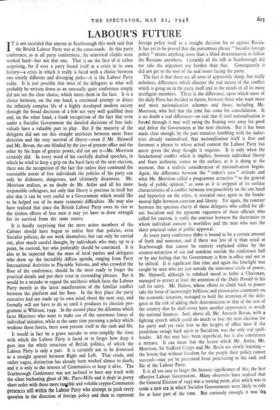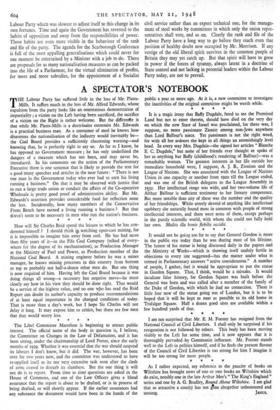LABOUR'S FUTURE
IT is not recorded that anyone at Scarborough this week said that the British Labour Party was at the cross-roads. At this party conference, as at all party conferences, the oratorical clichés were worked hard—but not that one. That is on the face of it rather surprising, for if ever a party found itself at a crisis in its own history—a crisis in which it really is faced with a choice between two utterly different and diverging paths—it is the Labour Party today. It is just possible that most of the delegates at what will probably be written down as an unusually quiet conference simply did not see the clear choice, which stares them in the face. It is a choice between, on the one hand, a continued attempt to direct the infinitely complex life of a highly developed modern society through the broad decisions of a few not very well qualified men and, on the other hand, a frank recognition of the fact that even under a Socialist Government the detailed decisions of free indi- viduals have a valuable part to play. But if the majority of the delegates did not see this straight antithesis between more State direction and the very survival of liberty—even if Mr. Shinwell and Mr. Bevan, the one blinded by the joys of present office and the other by the hope of greater power, did not see it—Mr. Morrison certainly did. In every word of his carefully drafted speeches, in which he tried to keep a grip on the hard facts of the next election, there was the recognition of the fact that unless they command the reasonable assent of free individuals the policies of his party can only be dishonest, dangerous, and ultimately disastrous. Mr. Morrison realises, as no doubt do Mr. Attlee and all his more responsible colleagues, not only that liberty is precious in itself but also that it can be very useful to a Government which would hle to be helped out of its many economic difficulties. He may also have realised that since the British Labour Party owes its rise to the tireless efforts of free men it may yet have to draw strength for its survival from the same source.
It is hardly surprising that the more active members of the Cabinet should have begun to realise first that policies, even Socialist policies, do not work themselves, but can only be carried out, after much careful thought, by individuals who may, up to a point, be coerced, but who preferably should be convinced. It is also to be expected that the mass of local parties and delegates who drew up the incredibly diffuse agenda, ranging from Party International Activities to Pin-table Saloons, and who crowded the floor of the conference, should lie the most ready to forget the practical details and put their trust in resounding phrases. But it would be a mistake to regard the antithesis which faces the Labour Party merely as the latest manifestation of the familiar conflict between the platform and the floor. In the first place the party executive had not made up its own mind about the next step, and formally will not have to do so until it produces its election pro- gramme at Whitsun, 1949. In the second place the dilemma which faces Ministers who want to make use of the enormous forces of individual initiative, while at the same time pursuing a policy which weakens those forces, must soon present itself to the rank and file.
It would in fact be a grave mistake to over-simplify the issue with which the Labour Party is faced or to forget how deep it goes into the whole structure of British politics, of which the Labour Party is only a part. It is certainly not to be dismissed as a straight quarrel between Right and Left. That crude, and rather vague, distinction has already been worked almost to death, and it is only to the interest of Communists to keep it alive. The Scarborough Conference was not inclined to have any truck with the silent beckoning ghost of Mr. Plaits-Mills and it dealt in pretty short order with those more tangible and voluble crypto-Communist presences still within the Labour Party who attempt to push every question in the direction of foreign policy and then to represent foreign policy itself as a straight decision for or against Russia. It has yet to be proved that the portentous phrase " Socialist foreign policy " means anything more than a blind determination to follow the Russians anywhere. Certainly all the talk at Scarborough did not take the argument any further than that. Consequently it did not get to the root of the real issues facing the party.
The fact is that there are all sorts of apparently sharp, but really nebulous, differences which obscure the real nature of the conflict which is going on in the party itself and in the minds of all its more intelligent members. There is the difference, upon which most of the daily Press has decided to fasten, between those who want more and more nationalisation schemes and those, including Mr. Morrison, who feel that the time has come for consolidation. It is no doubt a real difference—so real that if steel nationalisation is forced through it may well swing the floating vote away for good and defeat the Government at the next election. But it has been made clear enough, by the past tentative fumbling with the indus- tries already nationalised, that nationalisation itself is first and foremost a phrase to whose actual content the Labour Party has never given the deep thought it requires. It is only when the fundamental conflict which it implies, between individual liberty and State authority, comes to the surface, as it is doing at the moment, that a realistic consideration of nationalisation begins. Again, the difference between the " tinker's cuss " attitude and what Mr. Morrison called a programme attractive " to the general body of public opinion," as soon as it is stripped of its surface characteristics of a conflict between irresponsibility on the one hand and hypocrisy on the other, is revealed once again as the funda- mental fight between coercion and liberty. Yet again, the contrast between the specious clarity of those delegates who called for all- out Socialism and the apparent vagueness of those officials who called for caution, is really the contrast between the doctrinaire to whom individual consent is worthless and the man who sees the sheer practical value of public approval.
At every party conference there is bound to be a certain amount of froth and nonsense, and if there was less of it than usual at Scarborough that cannot be entirely explained either by the counter-attraction of sea and sunshine outside the conference hall or by any feeling that the Government is firm in.office and not to be shifted. It is significant that time and again the limelight was caught by men who are just outside the innermost circle of power. Mr. Shinwell, although in subdued mood as befits a Chairman, managed to attract at least the attention of the Daily Herald to his call for unity. Mr. Dalton, whose efforts to climb back to power take the form of increasingly bellicose and provocative comments on the economic situation, managed to hold the attention of the dele- gates at the risk of adding their determination to that of the rest of the country that he shall never have another opportunity to wreck the national finances. And, above all, Mr. Aneurin Bevan, with a fighting speech which could do much to lose the next election for his party and yet raise him to the heights of office later if the pendulum swings back again to Socialism, was the only real spell- binder. All this may have been superficial, but it also constitutes a menace. It can mean that the lesson which Mr. Attlee, Mr. Morrison, Sir Stafford Cripps and Mr. Bevin are slowly learning— the lesson that without freedom for the people their policy cannot succeed—may yet be prevented from penetrating to the rank and file of the Labour Party. It is all too easy to forget the historic significance of this, the first effective Labour Government. Many observers have realised that the General Election of 1945 was a turning point, after which was to come a new era in which Socialist Governments were likely to rule for at least part of the time. But curiously enough, it was thi Labour Party which was slowest to adjust itself to this change in its own fortunes. Time and again the Government has reverted to the habits of opposition and away from the responsibilities of power. Those habits are even more visible in the behaviour of the rank and file of the party. The agenda for the Scarborough Conference is full of the most appalling generalisations which could never for one moment be entertained by a Minister with a job to do. There are proposals for as many nationalisation measures as can be packed into the life of a Parliament, for the virtual elimination of profits, for more and more subsidies, for the appointment of a Socialist civil service rather than an expert technical one, for the manage- ment of steel works by committees in which only the union repre- sentatives shall vote, and so on. Clearly the rank and file of the Labour Party have a long way to go before they reach even that position of healthy doubt now occupied by Mr. Morrison. If any vestige of the old liberal spirit survives in the common people of Britain they may yet catch up. But that spirit will have to grow in power if the forces of tyranny, always latent in a doctrine of State control and not lacking in potential leaders within the Labour Party today, are not to prevail.



































 Previous page
Previous page